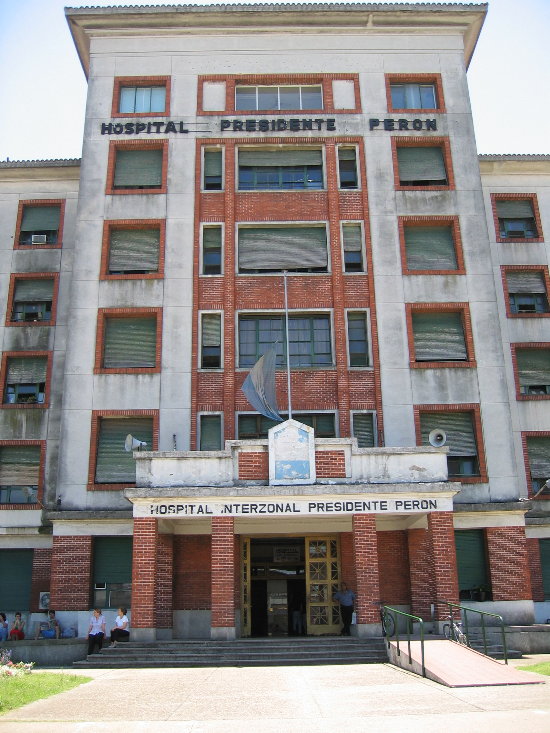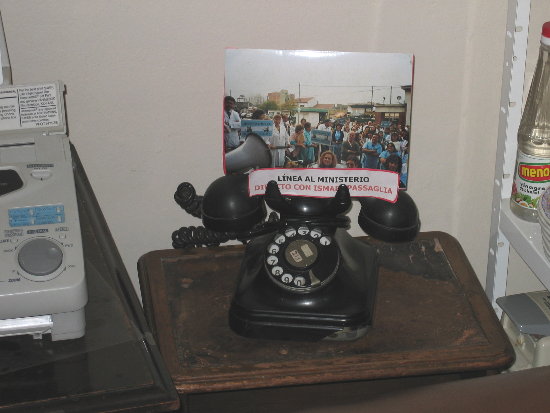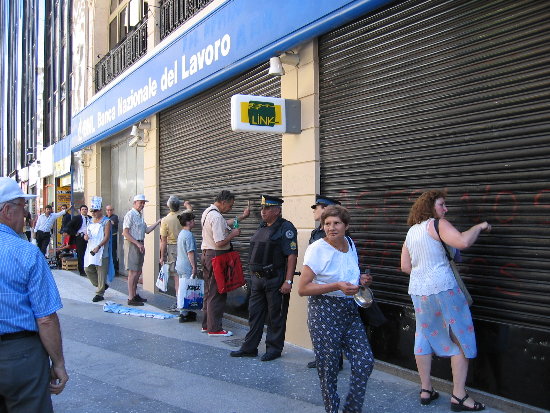From the Open-Publishing Calendar
From the Open-Publishing Newswire
Indybay Feature
“This Is Your Future”
Global Exchange trip to Argentina provides insights into privatization both there and at home in the Central Valley. For a related story about privatization in Fresno, see: http://sfbay.indymedia.org/news/2004/06/1686399.php

“This Is Your Future”
by Jan Slagter
In these words, I heard Horacio Quevedo, a registered nurse working three jobs in order to take home about $330 a month, predicted that Argentines’ suffering is a fate we in the United States will share, when I participated in a “reality tour” in Buenos Aires in January. After all, with the WTO, FTAA, and so on, poverty-producing economic and political policies are global.
In late December 2001, the Argentine economy, which had been weakening for at least five years, crashed. The government, at the insistence of international lending agencies (and the US has the biggest share of control of these agencies) let the Argentine peso fall. Those fortunate enough to have savings were prohibited from withdrawing their money from banks.
Factories had been closing before this event, and now more failed. Unemployment was already high and shot up to more than 30%. Within six months, Argentina, which had had the highest standard of living in all of Latin America, the most skilled labor force and the most diversified economy, had half of its population living in poverty.
What caused the fall? Economic policies through which the Argentine government sold off or outsourced nearly all publicly owned services, and the unscrupulous practices of local and international “investors.” We are living through an era in which we’re told that big government that provides services to its citizens is bad and must shrink.
Argentines, whose elite were investing outside their country, and whose government was on the take and linked to wealthy interests (think Halliburton, Enron), needed outside capital, and the international financial institutions made outsourcing, opening up the market to foreign companies, and shrinking of government part of the price of the loans.
And Argentina became the champion privatizer. The government privatized the railroads. Railroad buyers shut down all but a few miles and, of course, fired most of the workers. The government sold the mail service, and energy production services. They even sold the street signs!
The government sold off the services that provide water, sewers, and water treatment to half of Argentines, those who conveniently live in and around Buenos Aires, to the multinational company that administers the Suez Canal. In order to make the water system attractive to this Fortune 500 company, the government first set about raising water rates more than 100%.
Suez’s policies have almost doubled water bills again. Forty percent of water workers lost their jobs, but Suez’s profits for nine years exceeded even the 6 – 12% that US businesses consider reasonable. Services? The contract stipulates that Suez will not only expand the water delivery system, but also the sewer and drainage system. But the company has focused on expanding services where it will gain the most profit, which does not include sewers in poorer neighborhoods. (Does anyone remember Jim Patterson’s plan to privatize Fresno’s sewers?)
One of Horacio’s jobs is in the Juan Peron regional hospital, a hospital that was state of the art when it was built for the purpose of providing excellent health care to workers residing in an impoverished neighborhood of Buenos Aires, in 1950. Here, Eva Peron, “Evita,” lived out her last painful months in a room that still holds furnishings she used until her death from breast cancer.
Besides selling off state enterprises, Argentina has had to cut education, health care, and all other forms of social funding. Argentina has universal health care, but has outsourced all but medical and janitorial staff at its hospitals.
Hospital Juan Peron is falling apart. It no longer has the budget to maintain all areas of the building in working condition. The machines in the large laundry room are rusting; the former cafeteria is now a storage facility and inhabited by rats. Food and laundry services have been outsourced. The only laundry and food service workers at the hospital are those who load and unload the trucks of the private company, and these workers earn far less than did the unionized workers who preceded them.
Health programs are grossly underfunded. The poverty that has resulted from the cuts in public spending and the disappearance of decent jobs are evident here. Nurses and doctors report seeing growing rates of such illnesses as rickets, malnutrition, and TB, which had been rare in Argentina.
Yes, there are many differences between the United States and Argentina. But tax cuts for businesses and the wealthy mean that we face similar crises and similar trends in privatizing. States receive less funding from federal taxes for education and health care, for example, and now the State of California is raiding local tax sources to make up for its tax cuts. Even Fresno Mayor Autry is lobbying against this move.
As US citizens it is extremely important to learn the role of this country in Argentina’s troubles. Most striking for me was the realization of the continued US military presence in Argentina. While we may know that the United States trained many of the Argentine officers who disappeared, tortured, and killed 30,000 Argentines from 1976 to 1983, and provided financial aid to the military dictators, I was shocked to learn that the United States has been conducting joint military exercises in Argentina over the last several years, and that we have Marines in the Misiones area.
It is not a coincidence that the world’s third-largest fresh-water reserve, the Guarani Aquifer, lies under that territory, and that multinational companies are negotiating for its control. The United States presses Argentina for permanent bases, surveils, collects intelligence, and trains Argentine and other Latin American armies in new technologies, toward the end of protecting what may soon be a privatized aquifer.
I went to Argentina to learn what Argentines have been doing to recreate their livelihoods, and they have a lot to teach us. Their presence in the streets brought down four successive governments in two weeks. They have created neighborhood popular assemblies, direct democracies, which meet weekly and develop local economic and political alternatives and strategies. Many sectors of the movement are completely opposed to all political parties, preferring to create their own non-partisan alternatives.
Factory workers have reopened more than 200 factories that their owners have declared bankrupt and abandoned, including the largest ceramic tile factory in Argentina. Unemployed workers’ movements regularly block the highways at strategic points and at the same time have created popular education, as well as kitchens and bakeries to feed the poor. They created alternative currencies based on barter systems, which were in use by at least 5 million (out of a population of 35 million) people at their height. They are learning to work together, to act collectively despite differences, to build decentralized populist organizations.
To see a related story - about privatization of vital services in Fresno, go to: http://sfbay.indymedia.org/news/2004/06/1686399.php
To find out about Global Exchange reality tours, contact <http://www.globalexchange.org>.
For information on current movements in Argentina, see <http://www.lavaca.ar> and indymedia’s Argentina site.
by Jan Slagter
In these words, I heard Horacio Quevedo, a registered nurse working three jobs in order to take home about $330 a month, predicted that Argentines’ suffering is a fate we in the United States will share, when I participated in a “reality tour” in Buenos Aires in January. After all, with the WTO, FTAA, and so on, poverty-producing economic and political policies are global.
In late December 2001, the Argentine economy, which had been weakening for at least five years, crashed. The government, at the insistence of international lending agencies (and the US has the biggest share of control of these agencies) let the Argentine peso fall. Those fortunate enough to have savings were prohibited from withdrawing their money from banks.
Factories had been closing before this event, and now more failed. Unemployment was already high and shot up to more than 30%. Within six months, Argentina, which had had the highest standard of living in all of Latin America, the most skilled labor force and the most diversified economy, had half of its population living in poverty.
What caused the fall? Economic policies through which the Argentine government sold off or outsourced nearly all publicly owned services, and the unscrupulous practices of local and international “investors.” We are living through an era in which we’re told that big government that provides services to its citizens is bad and must shrink.
Argentines, whose elite were investing outside their country, and whose government was on the take and linked to wealthy interests (think Halliburton, Enron), needed outside capital, and the international financial institutions made outsourcing, opening up the market to foreign companies, and shrinking of government part of the price of the loans.
And Argentina became the champion privatizer. The government privatized the railroads. Railroad buyers shut down all but a few miles and, of course, fired most of the workers. The government sold the mail service, and energy production services. They even sold the street signs!
The government sold off the services that provide water, sewers, and water treatment to half of Argentines, those who conveniently live in and around Buenos Aires, to the multinational company that administers the Suez Canal. In order to make the water system attractive to this Fortune 500 company, the government first set about raising water rates more than 100%.
Suez’s policies have almost doubled water bills again. Forty percent of water workers lost their jobs, but Suez’s profits for nine years exceeded even the 6 – 12% that US businesses consider reasonable. Services? The contract stipulates that Suez will not only expand the water delivery system, but also the sewer and drainage system. But the company has focused on expanding services where it will gain the most profit, which does not include sewers in poorer neighborhoods. (Does anyone remember Jim Patterson’s plan to privatize Fresno’s sewers?)
One of Horacio’s jobs is in the Juan Peron regional hospital, a hospital that was state of the art when it was built for the purpose of providing excellent health care to workers residing in an impoverished neighborhood of Buenos Aires, in 1950. Here, Eva Peron, “Evita,” lived out her last painful months in a room that still holds furnishings she used until her death from breast cancer.
Besides selling off state enterprises, Argentina has had to cut education, health care, and all other forms of social funding. Argentina has universal health care, but has outsourced all but medical and janitorial staff at its hospitals.
Hospital Juan Peron is falling apart. It no longer has the budget to maintain all areas of the building in working condition. The machines in the large laundry room are rusting; the former cafeteria is now a storage facility and inhabited by rats. Food and laundry services have been outsourced. The only laundry and food service workers at the hospital are those who load and unload the trucks of the private company, and these workers earn far less than did the unionized workers who preceded them.
Health programs are grossly underfunded. The poverty that has resulted from the cuts in public spending and the disappearance of decent jobs are evident here. Nurses and doctors report seeing growing rates of such illnesses as rickets, malnutrition, and TB, which had been rare in Argentina.
Yes, there are many differences between the United States and Argentina. But tax cuts for businesses and the wealthy mean that we face similar crises and similar trends in privatizing. States receive less funding from federal taxes for education and health care, for example, and now the State of California is raiding local tax sources to make up for its tax cuts. Even Fresno Mayor Autry is lobbying against this move.
As US citizens it is extremely important to learn the role of this country in Argentina’s troubles. Most striking for me was the realization of the continued US military presence in Argentina. While we may know that the United States trained many of the Argentine officers who disappeared, tortured, and killed 30,000 Argentines from 1976 to 1983, and provided financial aid to the military dictators, I was shocked to learn that the United States has been conducting joint military exercises in Argentina over the last several years, and that we have Marines in the Misiones area.
It is not a coincidence that the world’s third-largest fresh-water reserve, the Guarani Aquifer, lies under that territory, and that multinational companies are negotiating for its control. The United States presses Argentina for permanent bases, surveils, collects intelligence, and trains Argentine and other Latin American armies in new technologies, toward the end of protecting what may soon be a privatized aquifer.
I went to Argentina to learn what Argentines have been doing to recreate their livelihoods, and they have a lot to teach us. Their presence in the streets brought down four successive governments in two weeks. They have created neighborhood popular assemblies, direct democracies, which meet weekly and develop local economic and political alternatives and strategies. Many sectors of the movement are completely opposed to all political parties, preferring to create their own non-partisan alternatives.
Factory workers have reopened more than 200 factories that their owners have declared bankrupt and abandoned, including the largest ceramic tile factory in Argentina. Unemployed workers’ movements regularly block the highways at strategic points and at the same time have created popular education, as well as kitchens and bakeries to feed the poor. They created alternative currencies based on barter systems, which were in use by at least 5 million (out of a population of 35 million) people at their height. They are learning to work together, to act collectively despite differences, to build decentralized populist organizations.
To see a related story - about privatization of vital services in Fresno, go to: http://sfbay.indymedia.org/news/2004/06/1686399.php
To find out about Global Exchange reality tours, contact <http://www.globalexchange.org>.
For information on current movements in Argentina, see <http://www.lavaca.ar> and indymedia’s Argentina site.



Add Your Comments
Latest Comments
Listed below are the latest comments about this post.
These comments are submitted anonymously by website visitors.
TITLE
AUTHOR
DATE
An Emerging Catastrophe
Mon, Jul 19, 2004 9:25AM
We are 100% volunteer and depend on your participation to sustain our efforts!
Get Involved
If you'd like to help with maintaining or developing the website, contact us.
Publish
Publish your stories and upcoming events on Indybay.
Topics
More
Search Indybay's Archives
Advanced Search
►
▼
IMC Network


